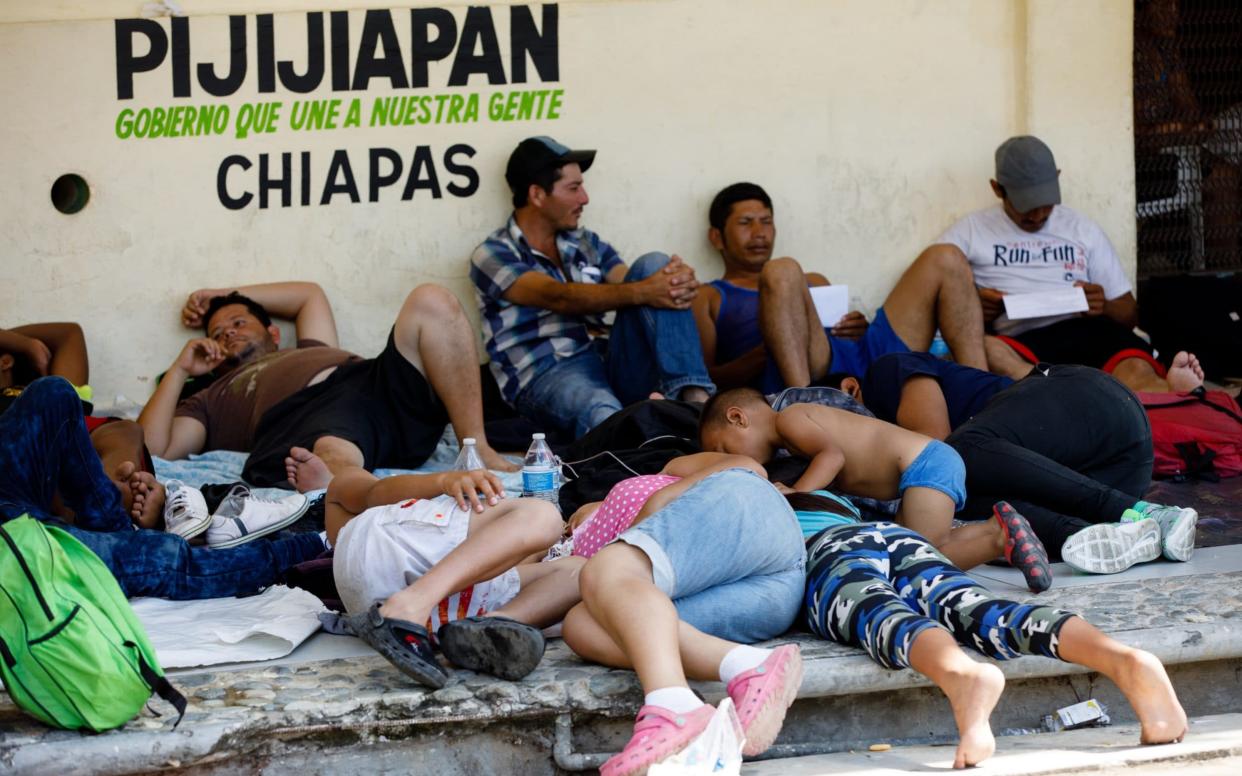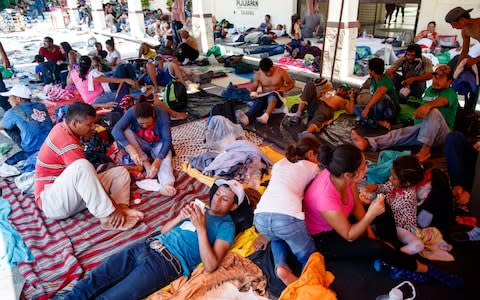Despite Donald Trump's warnings the weary migrant caravan of hope marches onwards

In Honduras she had run a stall selling pupusas, a local tortilla, but been forced to shut down after being extorted by street gangs.
"If you don't pay them they kill you," said the woman, drawing a finger slowly across her throat. "It's like a tax of war, money to bandits, and you can't not pay.
"They made me pay 300 lempira a week - $12. To you it does not sound like a lot, but for me it was a lot. I had to close."
After shutting her stall three months ago the 35-year-old, who gave her name as Carolina, decided to head north. She had seen Honduran television coverage of the US-bound migrant caravan that was then just forming.
She brought her four-year-old daughter and a small bag of clothes. There was no room for toys. The girl caught a fever as they crossed the Mexican border, and cried the whole way as she was pushed in a stroller.
"I've been walking so I don't know what Donald Trump is saying at the moment," said Carolina. "I know he doesn't like me. There is nothing I can do about it. But I will keep going until I get to the United States. When I get there I will open a pupusa stall."

By Friday, along with around 4,000 other migrants, she had reached the small Mexican town of Pijijiapan. They took over its pretty main square and sheltered from the blistering sun under tarpaulins. Local nuns disinfected and bandaged their blistered feet, treated fungal infections, and doled out bowls of rice at the church.
Some migrants said their phones were confiscated at the Mexican border, so they had only heard snippets about Mr Trump vowing not to let them in to America. What they had heard appeared to be having little effect.
With the midterm US congressional elections looming on November 6, Mr Trump has pushed the migrant caravan to the top of the political agenda, making it a symbol of his determination to crack down on illegal immigration. It is an issue that resonates with Republican voters, and one that could drive more of them to the polls on election day.
Mr Trump is now said to be considering an executive order closing the US-Mexico border to all asylum seekers from Central America. Meanwhile Jim Mattis, the defence secretary, on Friday authorised the deployment of up to 1,000 troops to the border by the end of the month.
To those in the Caravan, turnaround, we are not letting people into the United States illegally. Go back to your Country and if you want, apply for citizenship like millions of others are doing!
— Donald J. Trump (@realDonaldTrump) October 25, 2018
The caravan is still more than 1,000 miles from the border, but advancing tens of miles a day. During the rest stop in Pijijiapan local people express sympathy for the migrants. The main square became a makeshift triage centre as charities and residents handed out medicine.
A small boy cried as he was treated for a spider bite. One migrant woman said she was too exhausted to talk as she and her five young children lay down on the ground and went to sleep. In side roads near the square groups of young men slept in lines, using backpacks as pillows, or playing cards.
"When we get nearer the border I'll go over with a coyote," one said, explaining that he planned to pay a people smuggler to sneak into America, rather than claiming asylum.

Nearby, under a tree Beatrice Pachego, 33, had parked a pink baby stroller decorated with characters from Frozen. She had used it to push her daughter Marie, four, some 600 miles from Honduras, getting lifts in trucks some of the way.
"There is just nothing for us in Honduras," she said, breaking down in tears. "I used to do cleaning and washing in a house. I earned 100 lempira a day - $4. A friend in my village told me about the caravan and we went.
"Marie has cried a lot, but she's been very good. It's hardest for her. I tell her we'll have a better life at the end. I'll clean, I'll wash, I'll do whatever I can in America." Asked what welcome she thought they would get, she said: "I don't know. I don't know."
At a medical tent run by nuns Alex Escobar, 55, was being treated for bruises he said were inflicted by Mexican border police. "I got robbed three months ago in Honduras," he said, showing a six-inch slash on his arm from a machete. "I saw the caravan on the TV news. I had to go. If I go back to Honduras the street gangs will kill me. The government is doing nothing about the problem."

The car mechanic broke down describing how he left his wife and five children behind. "There was a lot of pain. But I told her I will make it to the United States, and I will. They will not stop me. I will send money back. One day my family will join me. I'm good with cars. I can use it to make money."
One of the young men travelling alone rejected suspicions that he would commit crimes in America. Cleiber Calderon, 22, who was wearing an old England football shirt, said: "Trump is loud. Very loud. He's wrong. The country I come from, Honduras, is totally corrupt. Our president is a real madman. I just want a better life. I'll work and send money back to my mother”.
Mr Calderon said he earned 1,700 lempira - about $70 a week - in a sugar factory in Honduras. He hoped to reach Virginia, where he had an uncle. He also saw the caravan on the TV news. "I told my mother I was going and she cried, but really she knows it's for the best. What else can I do with my life?" he said.
On Friday the caravan seemed to have dwindled partially from its peak estimate of 7,200, but there were still thousands streaming out of Pijijiapan on to the highway north for the next stage. Trucks stopped to pick some up, and groups including Jehova's Witnesses stood with water at the side of the road.
On Twitter the message from Mt Trump was clear. The president said he may "play a much tougher hand" in future. "To those in the Caravan, turnaround, we are not letting people into the United States illegally," he said.
Protect yourself and your family by learning more about Global Health Security

